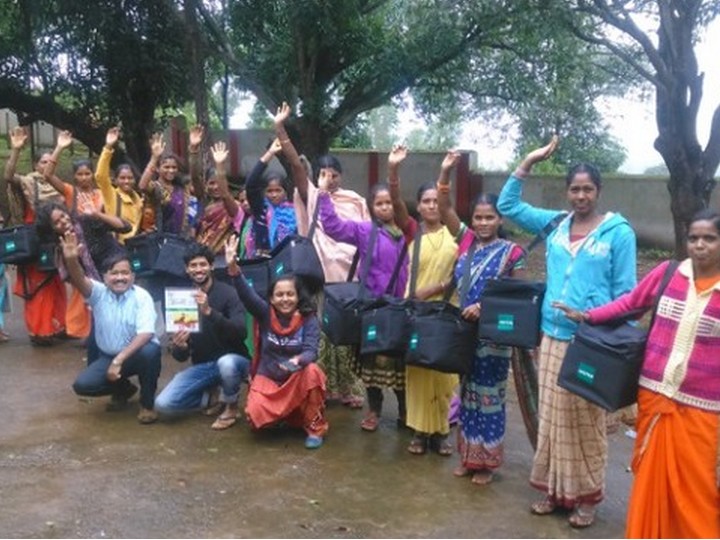


Pause and listen to our community health workers
The following is a reflection of my experience working with community health workers (CHWs) so far. Here “community health workers” has been used to refer (like by WHO here) to individuals who are selected, trained, and who work in the community which they often come from. In the Indian context this may refer to ASHAs (Accredited Social Health Activists) as in the public health system, or “lay health workers”/ “outreach workers” / “field workers”/ “Health facilitators” etc. who have been part of NGOs that work for health of various communities.
Being mindful to the personal challenges that the CHWs may have–
CHWs are individuals who care for people, listen to the numerous challenges that people face, help them navigate through those challenges, and meet expectations of the program. At the same time, most are also dealing with similar difficulties themselves in their personal lives and may have backgrounds like those whose welfare we are working towards. This is obvious when we recall how they are selected- mostly from the same location/ communities etc. Just to give a hypothetical example (that is completely plausible) – we may be trying to address mental health concerns in the communities we work with through CHWs, but did we see or listen to our own staff member who is acutely dealing with domestic abuse at her house? In order to do so, I believe that we must build a cultural environment where there is space to share opinions, decisions, care for each other, trust that they would be listened to and helped, and feel that the system exists for the welfare of the staff and the people and not to get someone else’s job done. And this I state not as a means to an end or just a strategy to keep CHWs healthy so that they can empower the community in turn but is an end in itself. We need to respect and care for the CHWs’ welfare whom we work with. Empowering them will make them powerful leaders and have a better outcome for the community. This article explains well how the performance of CHWs is influenced by several work related factors.
Community health workers have deep insights and lessons to learn from-
Community health workers have deep insights. We must listen to them. For e.g.; while having conversation with one of the health workers in our program, she mentioned how she treats the members that she is in-charge of (and I’ve observed this as well). She mentioned that she treats the members as her own. She doesn’t send the people who come to her home without a cup of tea/ coffee or even lunch. She expresses that there is a sense of satisfaction that is therapeutic to self when she supports a member towards their health. People know and have relied on her over 10 years despite her having changed jobs in-between. This was possible because she knows what her members want, listens, and does the best she can for them. So, she says, respect, empathy, understanding the needs, and clearly communicating to make people understand has helped her build strong relationships with her members. Aren’t these some amazing values that all health care professionals need to cultivate and practice?
She also acknowledged the fact that when she is invested deeply and empathetically, she gets affected by it. I’ve heard this from a few other health workers as well who often have their own personal stressors to deal with additionally. I could very well relate to this in my practice with difficult patients and I’m sure psychologists would have extensive training and practice on how not to get affected by their clients’ emotions. So why shouldn’t our health workers have such a space? Where they can vent out the emotional baggage that they may carry while caring for people who are vulnerable, while listening to some brutal stories helplessly. Like a Balint group session. Last year we had 1-2 such sessions but somehow didn’t continue. It definitely takes time for the purpose to become clear, for CHWs to open up and see the benefit but I’m sure it is worth having a space like this.
Constant power dynamics-
Unless wishfully structured otherwise, the equation often becomes one where the CHWs wait for and listen to the orders/ strategies that come from people with higher authority. And this may be counterproductive for innovation and to the whole exercise of working towards better health outcomes of the communities. It will also negatively impact building trust and a safe environment for CHWs as discussed above. Breaking these power barriers is perhaps a journey that takes time, and the culture cannot be broken in a day, but is one that needs to be prioritized.
I thank all the CHWs who are doing tremendous work and some of whom I’ve had the opportunity to work with and learn from. CHWs are pillars of our health care systems and are going to be so forever. So, let’s acknowledge their importance, the credit they have earned, and the admiration they deserve. Let’s make our workspaces better for CHWs. (Note that I haven’t even touched upon several many work-related challenges that CHWs face including low financial pays here.)
Was initially written in personal blog:
https://flavoursofmymind.wordpress.com/2021/03/27/pause-and-listen-to-our-community-health-workers/

| YOUNG DOCTORS MOVEMENT |STATE LEADERS | FMPC 2019 | FMPC 2022
| AFPI
© All rights reserved 2021. Spice Route India 2021
Contact us at TheSpiceRouteIndia@gmail.com